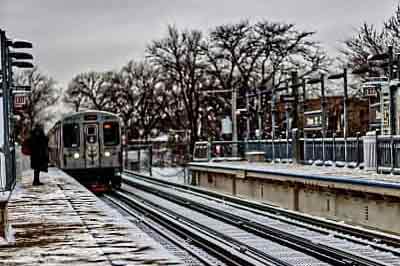An Edgewater man was killed in a Loyola Red Line train station accident in Chicago’s Rogers Park neighborhood.
Man Struck in Loyola Red Line Train Station Accident
The Loyola Red Line train station accident took place at around 8:30 p.m. on March 4, 2021. At that time, a 71-year-old man was walking on the platform at a CTA station located at 1200 W. Loyola Ave. on the city’s Far North Side. The man then stumbled into an advertising sign before falling onto the ground, according to a media notification from the Chicago Police Department.
The man apparently ended up in a position that placed some of his body off the edge of the platform, and he was struck by a northbound CTA Red Line train. He was then transported by emergency responders to Amita St. Francis Hospital in Evanston, where he was pronounced dead at 9:51 p.m.
The Cook County Medical Examiner’s Office had not yet released information on the man’s identity as of the following morning, but it revealed that he was from Chicago’s Edgewater neighborhood. An autopsy to determine the cause of the man’s death was scheduled for later that day. Area 3 detectives from the Chicago Police Department were also reportedly still investigating the Loyola Red Line train station accident at that time.
Why Public Transportation Accident Claims Are Difficult
Each year, Chicagoans take more than 500 million public transportation rides, predominantly through the CTA. With that many trips taken, there is a significant risk of injury. Trains might derail, buses could crash, and commuters may slip and fall on platforms or walkways, as seems to have been the case with the Loyola Red Line train accident. When this happens, victims might be able to seek recovery for their injuries if the public transportation agency proves to be at fault.
But obtaining compensation for a public transportation accident can be very difficult. An incident may have many potential causes, including defective traffic signals, overloaded vehicles, distracted operators, or equipment and mechanical failure. Sometimes a non-CTA vehicle could be the at-fault party, making its driver liable for any injuries. A plaintiff needs to start an investigation to determine the cause of an incident as soon as possible so that the responsible individual or entity can be properly identified.
In addition to the difficulty of determining fault, which is a key element of any personal injury claim, municipal entities like the CTA enjoy certain special protections under the law in these situations. Among these protections is an abbreviated “Statute of Limitations,” which is the time in which a victim has to file a lawsuit or otherwise resolve a claim. The Statute of Limitations for personal injury cases involving municipal entities is typically one year, whereas most other injury lawsuits have a Statute of two years (with some exceptions). If a public transportation accident lawsuit is not filed before this one-year timeframe ends, a plaintiff could be forever barred from obtaining compensation for his or her injuries.
Fighting for Victims of CTA Accidents
Because of the difficulties involved in pursuing a personal injury claim in a public transportation accident, injured parties should consider retaining seasoned legal counsel to help them obtain a positive outcome. For this reason, many victims of CTA accidents over the years have sought out the Chicago public transportation accident attorneys at GWC Injury Lawyers LLC.
With over $2 billion recovered for our clients in verdicts and settlements, GWC is one of the premier Personal Injury and Workers’ Compensation law firms in Illinois. No other plaintiff firm in the state is more respected – or more feared – by its adversaries, both inside and outside of the courtroom. Our Chicago personal injury lawyers have the experience, the determination, the resources, and the reputation of success necessary to get you and your family the justice you deserve.
If you have been wrongfully injured in a CTA accident, contact GWC today to schedule a free, no-obligation consultation with one of our dedicated attorneys. You may call our office at (312) 464-1234 or click here to chat with a representative at any time.
<< BACK TO BLOG POSTS